

Unclaimed: Are are working at Fibery ?
Fibery Reviews & Product Details
Fibery is a no-code development platform and workflow management software that helps users facilitate seamless internal processes from start to finish. With Fibery, users can unite user research, creativity, strategic planning, product road mapping, software development, and customer feedback aggregation via a single, user-friendly dashboard.

| Capabilities |
API
|
|---|---|
| Segment |
Small Business
Mid Market
Enterprise
|
| Deployment | Cloud / SaaS / Web-Based |
| Support | 24/7 (Live rep), Chat, Email/Help Desk, FAQs/Forum, Knowledge Base, Phone Support |
| Training | Documentation |
| Languages | English |

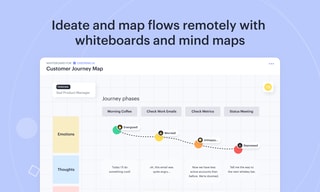
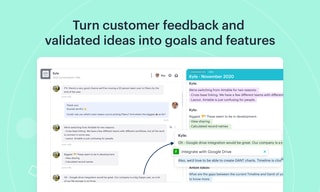
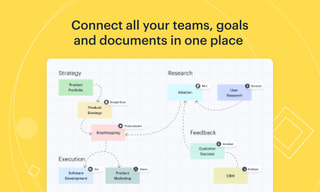
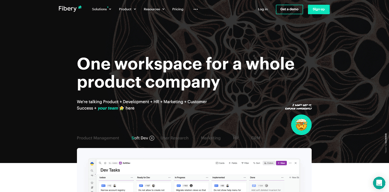
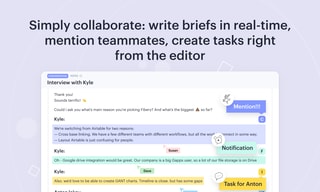
Compare Fibery with other popular tools in the same category.

the best part for me as a user was the customization part of Fibery. Once you figure out how to work with it becomes easy and really useful. So many option will fit any possible project.
for me personally, i have nothing to dislike. Our tech team though had mentioned some kind of issues about integrations, but me - i was in love with fibery for it's flexibility!
Fibery solved a bunch of time management problems with the team and for me as a product manager. Team and personal employees' tasks were all in control. Loved the percentage analytics that shows how far is the task done.
Fibery is an extremely flexible tool, there is clearly a great work in the decision of which features to implement and how. I think they get right the "tool for everyhing but not configurable by everyone". With a basic understanding of JS it is possible to script all the process that can't be done with the UI features in a simple manner.
The documents have margin for improvements , right now are "ok" . Also a better documentation a community reseources would help and
Fibery help us build processes for the whole company in an agile way
Our team works a lot at Fibery, it's a great pleasure, and we are very grateful! The sustainable existence of our voluntary-based project is largely ensured by the well-established processes, Scrum and the use of Fibery. We use Fibery quite unconventionally. For example, we maintain the content plan of our media and distribution across social networks (Instagram and Telegram) there. It's a good example of the flexibility and adaptability of Fibery! We distribute tasks by sprints, store follow-ups and guides probably like everyone else! While giving lectures on media management, we always mention Fibery and recommend the service!
Disadvantages were mostly related to the difficulty of switching to Fibery. All team members needed to get used to the new software and wide functionality. In the beginning it didn't seem intuitive, although in fact we just needed some time. It's also not extremely simple for the first setting of the workspaces but it takes only a couple of evenings to learn and adapt. Customer support at Fibery is very friendly and ready to help.
We use Fibery quite unconventionally. For example, we maintain the content plan of our media and distribution across social networks (Instagram and Telegram) there. It's a good example of the flexibility and adaptability of Fibery! We distribute tasks by sprints, store follow-ups and guides probably like everyone else!
Easy nocode automations that could do anything that you want to have. Super easy reference to anything else in Fibery or search through # A very responsibe and proactive Support team. They indeed care and want you to succeed in Fibery.
There is a not that wide amount of user rights of access to a space that I would like it to be. In my case I wanted the type of a right where the user has the ability to create an entity in the space but does not see another entities (created by someone else). However, the support team knows about this issue and assured me that they are woking on this.
I like that Fibery is very flexible. You can search and reference other entities by typing # and you can automate a lot of processes.
The whole solution is highly customizable and can cover all the use cases inside the company or project
It may require some effort to cover the edge cases of the workflow
It replaces multiple solutions with one. The great thing is that it can replace some software I don't really like, e.g. Jira
This is perhaps one of the best-designed software apps I've ever used (in any category) - it's intuitive, extensible and complete. The folks who wrote this really put a lot of thought into the UX and architecture.
TBH, the _only_ issue I've had is the color selector for picklist items is a bit fidgety. And that's it...
Fibery cleanly delineates between different domains (e.g. project/program management and knowledge management). I t comes with a number of fairly complete domain templates, but everything is extensible, so regardless of what I'm trying to do, I'm able to configure a suitable solution. From a UX perspective, everything is hierarchical (nested projects, tasks, etc) and drag n drop - never bound to artificial sequences (e.g. name order). This is a very future-proof tool.
Fibery provides the tools you need to build a workspace that fits your company's processes. As a construction project manager, there are way too many specialized software that create data silos, force you to use their products in a very specific way, and cost an arm and a leg to use. We want to have full access to our data, across all of our teams and processes, because when that data is connected and our teams knowledge and progress can be linked, it gives everyone the superpowers they need to save time and do their jobs more efficiently. And we are saving money while we are doing this. I highly recommend you try Fibery. Just create an account and try replicating one of your processes - you will become addicted to slowly transitioning every single process one by one.
It is completely customizable to what matters to me and my team. The relational database and automation capabilities are extremely flexible and easy to iterate on. And they have dynamic filtering of relationships that makes using it feel like magic. On top of this, there is constant upgrades to the item(entity) pages - which so many competitors ignore. So yes, you can create different views to see your items in a different way - but when you click on a specific item it doesn't feel like an afterthought - the item page has its own filtered views to visualize its unique relations. Which you can continually dig deeper and deeper into. This makes Fibery feel 3-dimensional where you can easily explore more and find what you need, when you need it.
Fibery is flexible and extremely quick and easy to develop/iterate on. Retool has some nice shinier features, and the SQL connections has a lot of benefits, but I found it slower and harder to define your processes. Potentially better if you already have the perfect process defined and have more time/money to throw at implementing it. But every few months we slightly refine our processes in Fibery or bring on new teams in our company and new processes (all in my free time while doing my normal job). It's just that easy.
Its powerful charting features allow me to achieve almost all my personalized needs; its easy-to-use automation features make me save a lot of time; its easy-to-use UI design allows me to edit and preview data quickly
Lack of a cover preview function available like Notion
To record my daily work and to analyze how I spend my time and what's wrong with them. I use it to do a daily review to understand what I did well today, what I didn't do well, and where I can improve
I like that you can customize Fibery to fit exactly what you do. Being able to interconnect any data in it and also from the outside feels like a superpower
Fibery is currently weak on whiteboarding and support for image-intensive or image-based process
Working in a startup, they are super kind, offering it free for a year! Using it we could model our workflow and process as we start with their startup template, which is great. It is not an easy concept to start with, but they offer great docs and do lots of webinars to support getting started. Their support is stellar!
Creating content, including articles/blogs, workflows, and data-powered content is very easy and powerful.
Not much; some of the content editing tools are not as powerful as other apps, but it has not taken away from the experience.
Helping capture client requirements and rapidly prototpye solutions; we are able to centralize our content in one place.





